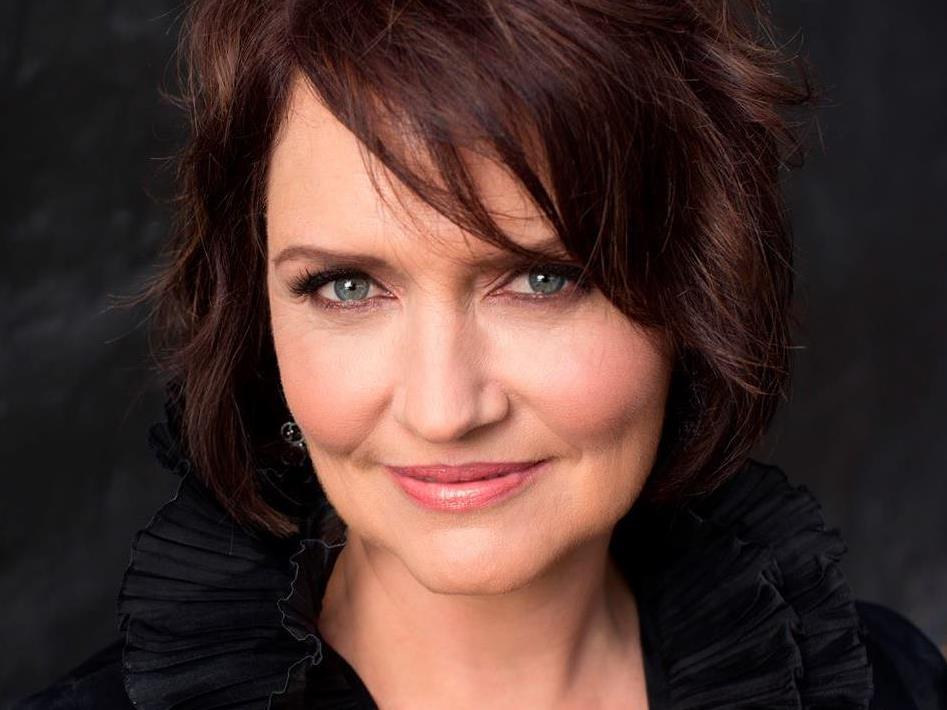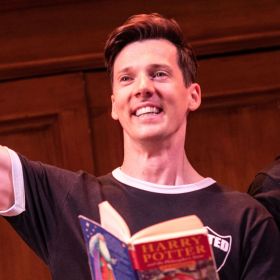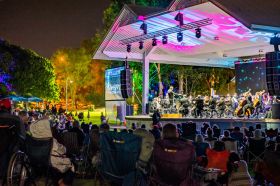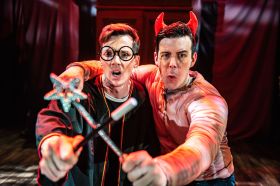Emma Matthews appears by kind permission of West Australian Opera. Photograph via David Wickham.
This is the third of four recitals under the Swansongs banner for this year, and it upheld the extremely high standard set by its predecessors. The brain child of accompanist David Wickham, Swansongs not only gives performing opportunities to some highly gifted musicians, but also showcases the talent of Wickham himself. I know a good accompanist when I hear one – I’m old enough to remember Henri Penn!
While no singer would go on stage without some effort to look his or her best, some have a clearer perception of audience expectations than others, and this is a sensitivity that Matthews definitely has in spades! A lovely black skirt with loose box pleats was topped by a gorgeous silver-sequined black bodice, complemented by perfectly matching brooch and earrings, with silver nail polish to finish off the glamorous effect.
This program had a serious theme: the human condition with its raw grief varied by occasional bouts of joy; joy that invariably carries seeds of further sadness. Music was selected from the oeuvres of five composers, with the opening bracket being made up of Aaron Copeland’s settings of Emily Dickinson’s nature poems. It gave us the highs and lows of what it means to be human through varied tempos, swings from major to minor keys and intense emotional content, varying from sweetness to melancholy to slightly jokey to outright angst and drama to hope of an afterlife. Whew! The music varied from gentle lyricism to crazy syncopation with wild and woolly melody and rhythm. Yet Dickinson’s words shone through in Matthews’ excellent presentation. Her final sostenuto was utterly breathtaking.
The second bracket gave us another gem in the form of a selection of Michael Leunig’s whimsical, happy-sad verse set to music by Melbournite Calvin Bowman. Here we had music that sometimes deliberately belied the words, such as the gentle berceuse rhythm of Tiny Boat which actually gives us a hint of the ultimate sadness and shortness of mortal life. The à cappella song ‘Moments of no consequence’ must have been written into the middle of the selection to give the pianist a break: heaven knows he must’ve needed one. None of this bracket made for easy performance or easy listening. The feeling of unease inherent in the subject matter was well-presented in the music
The third bracket comprised two songs from Now Touch the Air by William Jay Smith. The lovely triple-time Words by the Water was followed by the deeply moving Now Touch the Air Softly.
Here falleth the interval – with lots of tea, coffee and cake on offer – then we resumed our seats for the final bracket: verses by Jean Lahor, Charles Baudelaire and Robert de Bonnières set to music by Henri Duparc. Chanson triste, a lovely thing in compound triple time, sounded for all the world like sadness under running water. Le Manoir de Rosamond, I fear, made no sense to me in French or English, but I loved the gallop of horses in the second stanza and the jokey little piano coda. A nicely varied bracket to close the recital.
But wait, there’s more! Knoxville, Summer of 1915, by Samuel Barber, was listed in the program, but as I understood from a prior announcement, it would not be performed. However, the only way to quiet a clapping, cheering audience is to feed them more music, so we got this difficult work as a closing bracket. It is unusual to turn prose into song, and I’m not sure that it works, but in the context of this very experimental recital it served performers and audience well enough.
‘Singing,’ one of my teachers once told me, ‘is the art of making words more beautiful by music’. Yet art songs are not the easiest material to perform or to hear. They invariably contain lots of difficult intervals, strange rhythms and changing time signatures, and often the music is atonal – not the sort of thing you’d whistle in the shower. I think the audience was glad to have a perennial favourite, The Last Rose of Summer as an encore!
Swansongs is a series that ranges from the very good to the outright brilliant. This one falls into the ‘very good indeed’ category. It’s good to expand the boundaries of both performers and audience sometimes, and this recital gets an A+ for that!
Rating: 4.5 stars out of 5
Bliss
Emma Matthews with David Wickham
Perth Town Hall
25 September 2016





